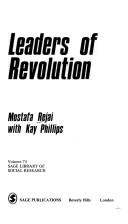| Listing 1 - 10 of 34 | << page >> |
Sort by
|
Book
ISBN: 0137857451 Year: 1974 Publisher: London Academic Press
Abstract | Keywords | Export | Availability | Bookmark
 Loading...
Loading...Choose an application
- Reference Manager
- EndNote
- RefWorks (Direct export to RefWorks)

ISBN: 0745603130 0745603122 9780745603131 9780745603124 Year: 1990 Publisher: Cambridge: Polity press,
Abstract | Keywords | Export | Availability | Bookmark
 Loading...
Loading...Choose an application
- Reference Manager
- EndNote
- RefWorks (Direct export to RefWorks)
Book
ISBN: 013154179X Year: 1974 Publisher: Englewood Cliffs (N.J.): Prentice Hall
Abstract | Keywords | Export | Availability | Bookmark
 Loading...
Loading...Choose an application
- Reference Manager
- EndNote
- RefWorks (Direct export to RefWorks)
#SBIB:324H75 --- Politieke verandering: revolutie --- Comparative government. --- Revolutions. --- Comparative government --- Revolutions --- Insurrections --- Rebellions --- Revolts --- Revolutionary wars --- Comparative political systems --- Comparative politics --- Government, Comparative --- Political systems, Comparative --- History --- Political science --- Political violence --- War --- Government, Resistance to

ISBN: 0415169496 041516950X 9780415169509 9780203977415 9781134739967 9781134740000 9781134740017 9780415169493 Year: 1999 Volume: *11 Publisher: London ; New York Routledge
Abstract | Keywords | Export | Availability | Bookmark
 Loading...
Loading...Choose an application
- Reference Manager
- EndNote
- RefWorks (Direct export to RefWorks)
Politics --- anno 1980-1989 --- Eastern and Central Europe --- Europe, Eastern --- Europe de l'Est --- Politics and government --- Politique et gouvernement --- #SBIB:328H27 --- #SBIB:328H26 --- #SBIB:321H60 --- #SBIB:324H75 --- #SBIB:IEB --- Instellingen en beleid: Midden- en Centraal Europa: algemeen --- Instellingen en beleid: USSR (actuele geschiedenis van de USSR: tot 1989) --- Westerse politieke en sociale theorieën vanaf de 19e eeuw: socialisme, marxisme, communisme, anarchisme --- Politieke verandering: revolutie --- #A9909H --- East Europe --- Eastern Europe --- -#SBIB:328H27 --- #SBIB:IEBInstellingen en beleid: Midden- en Centraal Europa: algemeen --- Politieke verandering: revolutie#A9909HEurope, Eastern --- Eastern EuropePolitics and government --- -Politics --- -Europe, Eastern --- Europe [Eastern ] --- 1989 --- -Europe [Eastern ] --- -#SBIB:321H60
Book
ISBN: 0029093902 Year: 1978 Publisher: New York Free Press
Abstract | Keywords | Export | Availability | Bookmark
 Loading...
Loading...Choose an application
- Reference Manager
- EndNote
- RefWorks (Direct export to RefWorks)
Social change --- 323.27 --- Revolutions --- #SBIB:324H75 --- #SBIB:324H71 --- Change, Social --- Cultural change --- Cultural transformation --- Societal change --- Socio-cultural change --- Social history --- Social evolution --- Insurrections --- Rebellions --- Revolts --- Revolutionary wars --- History --- Political science --- Political violence --- War --- Government, Resistance to --- Oproeren. Revolutie. Revolutionaire bewegingen. Staatsgreep --- Politieke verandering: revolutie --- Politieke verandering: modernisatie, democratisering, regional development --- Revolutions. --- Social change. --- 323.27 Oproeren. Revolutie. Revolutionaire bewegingen. Staatsgreep
Book
ISBN: 0521344190 Year: 1988 Publisher: Cambridge Cambridge University Press
Abstract | Keywords | Export | Availability | Bookmark
 Loading...
Loading...Choose an application
- Reference Manager
- EndNote
- RefWorks (Direct export to RefWorks)
Sociological theories --- 323.27 --- Revolutions and socialism --- Social choice --- #SBIB:321H60 --- #SBIB:324H75 --- Choice, Social --- Collective choice --- Public choice --- Choice (Psychology) --- Social psychology --- Welfare economics --- Socialism and revolutions --- Socialism --- Oproeren. Revolutie. Revolutionaire bewegingen. Staatsgreep --- Westerse politieke en sociale theorieën vanaf de 19e eeuw: socialisme, marxisme, communisme, anarchisme --- Politieke verandering: revolutie --- 323.27 Oproeren. Revolutie. Revolutionaire bewegingen. Staatsgreep
Book
ISBN: 0521096987 0521084415 9780521096980 9780521084413 Year: 1972 Publisher: Cambridge: Cambridge university press,
Abstract | Keywords | Export | Availability | Bookmark
 Loading...
Loading...Choose an application
- Reference Manager
- EndNote
- RefWorks (Direct export to RefWorks)
Political philosophy. Social philosophy --- Revolutions --- Révolutions --- Case studies --- Cas, Etudes de --- -#SBIB:328H32 --- #SBIB:328H50 --- #SBIB:324H75 --- Insurrections --- Rebellions --- Revolts --- Revolutionary wars --- History --- Political science --- Political violence --- War --- Government, Resistance to --- Instellingen en beleid: Midden en Latijns-Amerika --- Instellingen en beleid: Azië: comparatief / diverse landen --- Politieke verandering: revolutie --- Revolutions. --- Case studies. --- Révolutions --- #SBIB:328H32 --- Social change --- Revolutions - Case studies

ISBN: 0395126282 Year: 1973 Publisher: Boston Houghton Mifflin
Abstract | Keywords | Export | Availability | Bookmark
 Loading...
Loading...Choose an application
- Reference Manager
- EndNote
- RefWorks (Direct export to RefWorks)
Government, Resistance to --- Revolutions --- Résistance au gouvernement --- Révolutions --- #SBIB:324H75 --- Insurrections --- Rebellions --- Revolts --- Revolutionary wars --- History --- Political science --- Political violence --- War --- Civil resistance --- Non-resistance to government --- Resistance to government --- Insurgency --- Nonviolence --- Politieke verandering: revolutie --- Résistance au gouvernement --- Révolutions --- Political resistance

ISBN: 0803911394 0803911408 9780803911406 Year: 1979 Volume: 73 Publisher: Beverly Hills (Calif.): Sage,
Abstract | Keywords | Export | Availability | Bookmark
 Loading...
Loading...Choose an application
- Reference Manager
- EndNote
- RefWorks (Direct export to RefWorks)
Revolutions --- Revolutionaries --- Révolutions --- Révolutionnaires --- Psychology --- 323.27 --- #SBIB:324H75 --- #SBIB:324H41 --- Oproeren. Revolutie. Revolutionaire bewegingen. Staatsgreep --- Politieke verandering: revolutie --- Politieke structuren: elite --- Revolutionaries. --- Revolutions. --- Psychology. --- 323.27 Oproeren. Revolutie. Revolutionaire bewegingen. Staatsgreep --- Révolutions --- Révolutionnaires --- Insurrections --- Rebellions --- Revolts --- Revolutionary wars --- History --- Political science --- Political violence --- War --- Government, Resistance to --- Revolutionists --- Dissenters --- Counterrevolutionaries
Book
ISBN: 9789291982004 9291982008 Year: 2012 Publisher: Paris : European Union Institute for Security Studies,
Abstract | Keywords | Export | Availability | Bookmark
 Loading...
Loading...Choose an application
- Reference Manager
- EndNote
- RefWorks (Direct export to RefWorks)
In 2011, millions of citizens in the Southern Mediterranean took to the streets demanding an end to dictatorship and the right to choose their governments, and also affirming their right to their cultural and religious identities and well-being. Within months this extraordinary popular movement led to the downfall of three dictators. The now thirty-seven year old third democratic wave is finally sweeping the periphery of old Europe. This wave came in four phases: it caused the fall of the dictatorships in Europe in Portugal, Greece and Spain in the 1970s, then in Latin America and Asia in the 1980s and 1990s, followed by Eastern Europe and other countries in the 1990s; and now, after the lost decade at the start of this century, it is sweeping the Mediterranean and Arab world. This book assesses the democratic wave one year on, and what the options are for the EU in a post-Western international context. European initiatives, starting with the Barcelona summit in 2005, have given renewed impetus to the project of Euro-Mediterranean inclusion, and countered the view of Muslims as the enemy that has prevailed for too long in the West. Against this background, the challenge will be to accept the democratic choices of citizens in the South and to learn to live with the fact that Islamist parties are likely to come to power all over the region. Europeans will have to listen to these new and unfamiliar voices and acknowledge their legitimacy. These are the voices of those who need to recover their dignity. These may not be less democratic, but they will certainly be more autonomous. Europe needs to act as a consensus-builder in the Arab quest for democratic legitimacy and not as a divisive force that either supports secularist forces against Islamist parties or marginalises liberals in the name of a new political pragmatism. Europe and the US have to work with others to support transitions to democracy in the Arab world. The EU and some of its Member States are unavoidable actors in the Maghreb. The risk is that European policy choices may have a negative impact on local politics or that the EU offers the region insufficient means to address the huge social challenges it faces. In the Middle East, where the European Union is one among many actors, Europe risks becoming irrelevant in a region that remains the world's strategic hub. This book seeks to show that the democratic revolutions in the Arab countries offer a unique opportunity for the EU to contribute to a peaceful and democratic neighbourhood and to give a new impetus and raison d'être to the European project.
Democratization --- Démocratisation --- Arab countries --- European Union countries --- Etats arabes --- Pays de l'Union européenne --- Politics and government --- Foreign relations --- Politique et gouvernement --- Relations extérieures --- #SBIB:324H73 --- #SBIB:324H75 --- #SBIB:327.1H20 --- Politieke verandering: oppositie en minderheid, protest, politiek geweld --- Politieke verandering: revolutie --- Sociologie van de internationale betrekkingen: algemeen --- Démocratisation --- Pays de l'Union européenne --- Relations extérieures
| Listing 1 - 10 of 34 | << page >> |
Sort by
|

 Search
Search Feedback
Feedback About UniCat
About UniCat  Help
Help News
News